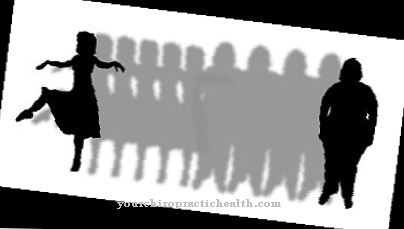to cough or. Chicks is that arbitrary or due to a Coughing stimulus on the Cough reflex triggered explosive expulsion of air, which opens the glottis with it. As a rule, there is a foreign body in the throat that triggers this cough. Coughing is a normal reaction of the human body to cleanse the throat, windpipe, bronchi, and lungs of foreign matter.
What is a cough?

Cough is not an independent disease, but always a symptom of one. On the one hand, those affected cough because a stimulus triggers the cough reflex.
On the other hand, coughing can also be arbitrary, for example to loosen mucus in the presence of mucus or to provide relief from scratching. It does this by contracting muscles after signals have been sent to the brain.
The task of this symptom of the disease is to clear the airways that have been affected by foreign substances. There is therefore the possibility that cough mucus (sputum) will be expelled. With a duration of three weeks, the cough is already categorized as chronic.
causes
The causes of a cough are initially to be found in the inhaled or self-formed foreign matter. This includes dust, smoke or leftover food. These irritate the receptors of the mucous membranes in the windpipe and bronchi. The resulting cough reflex is an involuntary reaction. However, one can also consciously cough in order to excrete foreign substances through the airways.
In addition to these harmless causes of coughing, there are also a number of diseases in which coughing is a symptom. These respiratory infections, such as colds and various lung diseases, are well known.
The cough itself can be broken down into a sudden cough (acute cough) and a chronic cough. A chronic cough is a cough that occurs for more than three weeks. Most of the time, smokers have this type of cough. Sputum (cough mucus) can be excreted via the airways. If the sputum is purulent yellow in nature, it is mostly a bacterial infection that causes the cough. If bloody cough mucus is coughed up or if the cough is even bloody, one can assume hemoptysis (coughing up blood).
You can find your medication here
➔ Medicines against coughs and coldsDiseases with this symptom
- cold
- pleurisy
- allergy
- Cystic fibrosis
- tuberculosis
- Reflux disease
- Sinus inflammation
- lung infection
- bronchial asthma
- COPD
- diphtheria
- Bronchiectasis
- flu
- bronchitis
- Pneumothorax
- Idiopathic interstitial pneumonia
- whooping cough
- Pseudo croup
Diagnosis & course
As is well known, cough is not a disease, but always a symptom of other diseases. In order to be able to classify the cough correctly, doctors usually ask those affected about their way of life - for example, about their diet or their habitual whereabouts. X-rays of the lungs or blood tests will clarify the cause of the cough and at the same time define its severity.
The course of the cough varies depending on the cause and disease. The cough is usually dry at the beginning and at the end of a cold, for example, while the cough is rather moist when combined with phlegm. As with other symptoms / illnesses, after an initial scratching of the throat, the cough becomes more intense over time.
Complications
Cough can be acute or chronic. Accordingly, the complications are also different.On the one hand, constant coughing can lead to stinging in the chest region and headaches, as the coughing creates repeated high pressure that compresses the vessels and thus reduces blood flow and stresses the chest and diaphragm.
In rather rare cases, this can lead to a rupture of the diaphragm and internal organs can emerge through this hernia. The groin can also fracture, resulting in a typical hernia. In addition, cramps in the diaphragm can occur, the blood flow is inhibited because the vessels are compressed, which can lead to brief fainting.
Coughing can also cause hoarseness and loss of voice, as the vocal cords are constantly stressed by coughing. In incontinent people it can happen that urine flows with every coughing attack. In addition, coughing can cause an asthma attack with difficulty breathing. In addition, internal organs such as the lungs can be injured by constant coughing.
When coughing, like belching, stomach acid can flow along and irritate the mucous membranes of the oral cavity and esophagus. Chronic coughing also affects social life. People close by feel disturbed by the cough and keep their distance from the person concerned.
When should you go to the doctor?
Since coughing can be a sign of a normal cold, you don't need to see a doctor right away. However, if there are additional symptoms, this may be necessary.
If the cough is accompanied by a fever or a general feeling of weakness, it could be a serious infection. The family doctor should be consulted first. This can decide whether it is necessary to take a cough suppressant or even an antibiotic.
Chronic cough, especially if it is particularly persistent, should also be clarified by a doctor. This is the case after a period of about two weeks. After this time, chronic symptoms such as bronchitis can develop. Coughs with yellowish-purulent sputum or even blood admixture should be clarified by the doctor.
Depending on what the doctor suspects is the cause of the cough, he will recommend a further examination by a specialist. A chronic cough can be clarified by an allergist to rule out an allergy. A particularly persistent cough that is accompanied by shortness of breath should, however, be examined by a pulmonologist.
This can test whether an underlying disease such as asthma or croup is hiding behind the symptoms. In most cases, these underlying diseases require detailed therapy. In children, the doctor should be consulted if the cough leads to shortness of breath, insufficient fluid is absorbed, or a fever occurs at the same time.
Doctors & therapists in your area
Treatment & Therapy
First of all, it should be considered whether the cough needs treatment at all. As a rule, a sudden cough as a result of a cold is harmless and subsides after about a week. However, if the cough persists or is accompanied by coughing up blood, a doctor should be consulted immediately. A possible disease such as pneumonia or lung cancer should now be ruled out by the doctor.
The doctor asks how the cough occurs and what symptoms (hoarseness, headache, runny nose, sore throat) are associated with it. Information about the type of cough mucus (sputum) and the time of day of the cough is also important. Possible previous illnesses and allergies as well as intolerances should be clarified. Habits such as smoking and working conditions should also be mentioned.
Then an examination of the throat, neck and upper body is carried out. The lungs and heart are monitored with a stethoscope. If an infection is suspected, the doctor will also have blood drawn in order to be able to examine the inflammation values. The cough phlegm is also examined for germs. An X-ray examination is also possible in suspected cases.
If the cause of the cough is still unclear or if the doctor wants to examine the results more closely, further examinations are useful. Possible further measures could be: tissue examination (biopsy), reflection of the larynx, reflection of the bronchi, irrigation of the bronchi, computed tomography, etc.
Depending on the ultimate cause, the cough or the disease that leads to the cough is treated. For the harmless cough of a cold, the well-known cough tablets (lozenges) or the cough syrup are the classics. These drugs are available over-the-counter in the pharmacy as well as prescription drugs. The cough suppressants are divided into cough removers and cough suppressants.
Cough removers are expectorant and promote expectoration of the cough mucus. In addition, they make the mucus more fluid, which can then be coughed up more easily. Herbal alternatives are fechel and aniseed oil. The antitussive drugs are primarily intended to suppress the cough reflex, which is particularly helpful for dry, irritating coughs. Natural alternatives are sufficient drinks in the form of water and teas (chamomile tea, fennel tea, anise tea and sage tea).
Furthermore, you should keep warm and take care of yourself. Smoking should also be completely stopped. Dry and dusty air should be avoided.
Outlook & forecast
Coughing usually promises a positive prognosis with few accompanying symptoms. Affected people often feel severe pain and suffer from expectoration and shortness of breath, especially in the case of an allergic cough, but the symptoms can be relieved quickly with effective medication.
The prognosis is more negative if the cough "wanders", that is, if it spreads from the upper respiratory tract to the bronchi. Such a change of floor can lead to allergic asthma or even bronchitis. However, the cough can be quickly cured with comprehensive treatment. The prospect of a quick recovery is therefore high in the case of a cough, whereby the possible secondary diseases and side effects must always be taken into account.
If the cough is accompanied by the flu, the cough will probably also take a more severe course with accompanying symptoms such as sputum and sore throat. If you have a cough as a result of pneumonia or a similarly serious illness, the prognosis also depends on the stage of the illness.
An early diagnosis can effectively treat a cough and usually disappears completely after a few days to a week.
prevention
Coughs that are not pathological can be prevented by a healthy life with lots of exercise, fresh air, a healthy diet and not smoking. Furthermore, if possible, you should not work and live in air-polluted rooms or areas. A mouthguard can have a short-term preventive effect.
You can find your medication here
➔ Medicines against coughs and coldsHome remedies & herbs for coughs
- Anise helps against flatulence, cough phlegm, asthma and white flow and ensures a good night's sleep.
- Cough tea is prepared as follows: 5 grams each of ribwort, lungwort, coltsfoot, woolly flower, aniseed grains, liquorice, hibiscus roots and 10 grams of Icelandic moss.
- Another cough tea is made from half a tablespoon of licorice, half a tablespoon of violet roots, one tablespoon of marshmallow roots, half a tablespoon of coltsfoot leaves, half a tablespoon of woolly flowers and the same amount of anise seeds. From this mixture you then make a cup of tea from a teaspoon. Preferably sweeten with honey.
- Regular consumption of apple cider helps against coughs: Boil the juice of sour apples with sugar and fennel and take it slowly.
- In milder cases, honey milk works very well for coughing. Dissolve a tablespoon of honey or fennel honey in a cup of hot milk. Drink a cup as hot as possible in the morning and in the evening.
- Spruce needle honey is a good expectorant cough suppressant. The blossoms of the spruce are mixed with sugar.
- Lilac blossoms are very sweaty, reduce fever and are effective against coughs and colds.
other home remedies ↵ for coughs
- Malve tea is a good remedy for colds and coughs.
- Coltsfoot has an appetizing effect and helps with coughs, mucus and hoarseness.
- For persistent coughs, drink boiled marjoram tea with honey and sip it in the morning, at noon and in the evening. This is particularly suitable for children.
You can do that yourself
An ideal measure to counteract a cough is to hang up damp cloths in the apartment. These can be optimally placed on the heater in order to humidify the air you breathe. It is also advisable to avoid contact with dust. Drink plenty of water to relieve coughs. Those affected should avoid dairy products to avoid mucus. In the first few days it is helpful to only consume liquid food. These include soups and tea fasts.
Coughs can also be treated with herbs. Marshmallow is particularly noteworthy. It has a calming effect on the inflamed mucous membranes. In addition, it has a cool and moist quality, which is why it is particularly suitable for dry, irritating coughs. A tablespoon of cut marshmallow root with 150 milliliters of water is required for use.
Schüßler salts are ideal for relieving coughs. One Ferrum phos tablet every hour. D 12 (No. 3) to be taken. If the cough is already advanced, potassium chlorine works. D 6 (No. 4) extremely good. If the cough is dry and convulsive, it can be treated with magnesium phos. (No. 7).
























.jpg)



